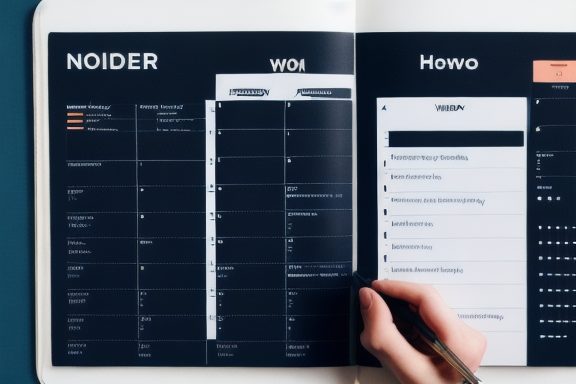The Importance of Time Management

Time management is the process of planning, organizing, and controlling how you spend your time to effectively accomplish your goals and tasks. It involves prioritizing activities, setting specific time slots for each task, and avoiding time-wasting activities. Effective time management allows individuals to make the most of their time, increase productivity, and reduce stress.
Time management is important for several reasons.
Firstly, it helps individuals become more productive and efficient. By prioritizing tasks and allocating time for each task, individuals can ensure that they focus on the most important and urgent tasks first. This prevents procrastination and ensures that deadlines are met. Additionally, effective time management allows individuals to complete tasks more efficiently, as they are able to allocate dedicated time for each task without getting distracted.
Secondly, time management helps individuals achieve a better work-life balance.
With effective time management, individuals can allocate time for work, personal activities, hobbies, and relaxation. This helps prevent burnout and allows individuals to have time for activities that bring them joy and fulfillment. By having a balanced schedule, individuals can have a more fulfilling personal life, which in turn can positively impact their overall well-being and mental health.
There are several benefits to practicing effective time management.
Increased Productivity
When individuals manage their time effectively, they are able to complete tasks more efficiently and with better focus. By eliminating time-wasting activities and distractions, individuals can maximize their productivity and accomplish more in less time.
Reduced Stress
Poor time management often leads to stress and anxiety. When individuals feel overwhelmed by a lack of time or impending deadlines, it can negatively impact their mental well-being. However, by effectively managing their time, individuals can reduce stress levels and feel more in control of their tasks and responsibilities.
Improved Decision-Making
Time management allows individuals to allocate dedicated time for planning and decision-making. By having a clear understanding of priorities and goals, individuals can make informed decisions and avoid making rushed or impulsive choices.
Opportunity for Growth and Development
Efficient time management creates opportunities for learning, growth, and personal development. By effectively managing time, individuals can allocate time for self-improvement activities, such as attending workshops, reading books, or taking online courses. These activities can enhance skills and knowledge, leading to personal and professional growth.
Overall, time management is a crucial skill that can greatly impact an individual’s productivity, well-being, and success. By prioritizing tasks, creating a balanced schedule, and avoiding time-wasting activities, individuals can make the most of their time and achieve their goals.
Tips for Effective Time Management
Managing your time efficiently is crucial for productivity and success. By implementing effective time management strategies, you can make the most of your day and accomplish your goals. Here are some tips to help you manage your time effectively:
Set Clear Goals and Prioritize Tasks
One of the key principles of effective time management is setting clear goals and prioritizing tasks. Start by identifying your goals, both short-term and long-term. Break them down into smaller, manageable tasks that you can work on. Prioritize your tasks based on their importance and urgency. This will help you stay focused and ensure that you are working on the most important things first.
Use Time Blocking to Schedule Your Day
Time blocking is a popular technique used by many successful individuals to manage their time effectively. It involves scheduling specific blocks of time for different activities or tasks. By assigning dedicated time slots for specific tasks, you can eliminate distractions and stay focused on one task at a time. This method also helps you visualize and plan your day better, ensuring that you allocate sufficient time for each task.
Eliminate Distractions and Procrastination
Distractions and procrastination can significantly hinder your productivity and time management efforts. It’s essential to identify potential distractions and take steps to eliminate or minimize them. This could include turning off notifications on your phone, closing unnecessary tabs on your computer, or finding a quiet and dedicated workspace. Additionally, be mindful of procrastination tendencies and actively work on overcoming them. Break tasks into smaller, actionable steps and use techniques like the Pomodoro Technique to stay focused and productive.
Delegate Tasks When Possible
Delegation is a valuable skill that can help you manage your time more effectively. Identify tasks that can be delegated to others, whether it’s a colleague, team member, or outsourcing to a professional service. Delegating tasks not only frees up your time but also allows you to focus on high-priority tasks that require your expertise. Remember to provide clear instructions and expectations when delegating to ensure successful completion of the task.
Take Regular Breaks to Rejuvenate
While it may seem counterintuitive, taking regular breaks is essential for maintaining productivity and avoiding burnout. Research shows that taking short breaks throughout the day can improve focus, concentration, and overall well-being. Incorporate short breaks into your schedule and use them to relax, stretch, or engage in activities that help you recharge. It’s also important to prioritize self-care and ensure you get enough sleep, exercise, and nourishing meals to optimize your energy levels and productivity.
Tools and Techniques for Time Management
Effective time management is crucial for maximizing productivity and achieving your goals. Fortunately, there are various tools and techniques available to help you stay organized and make the most of your time. Let’s explore some of the most effective strategies:
Use a Planner or Digital Calendar
One of the fundamental tools for time management is a planner or a digital calendar. These tools allow you to schedule your tasks, appointments, and deadlines, helping you stay organized and on track. Whether you prefer a physical planner or a digital calendar app, find a system that works best for you and make it a habit to regularly update and review your schedule.
Utilize Technology for Task Management
In today’s digital age, there are numerous task management tools available that can help streamline your workflow. From simple to-do list apps to more comprehensive project management software, these tools offer features like task prioritization, deadline tracking, and collaboration options. Find a tool that aligns with your needs and preferences to effectively manage your tasks and projects.
Try the Pomodoro Technique
The Pomodoro Technique is a time management method that encourages focused work and breaks. It involves working on a task for a set period, typically 25 minutes, followed by a short break of 5 minutes. After completing four Pomodoros, take a longer break of around 15-30 minutes. This technique helps improve concentration and productivity by breaking work into manageable intervals.
Use the Eisenhower Matrix for Prioritization
The Eisenhower Matrix, also known as the Urgent-Important Matrix, is a powerful tool for prioritizing tasks. It categorizes tasks into four quadrants based on their urgency and importance: urgent and important, important but not urgent, urgent but not important, and neither urgent nor important. By focusing on tasks that are both urgent and important, you can ensure that your time is spent on high-priority activities.
Practice the 80/20 Rule
The 80/20 Rule, also known as the Pareto Principle, states that roughly 80% of your results come from 20% of your efforts. Apply this principle to your time management by identifying the tasks that yield the most significant impact and prioritize them. By focusing on the most important activities, you can optimize your productivity and achieve better results.
Implement Batch Processing
Batch processing involves grouping similar tasks together and completing them in a single session. This technique can help minimize context switching and improve efficiency. For example, instead of responding to emails throughout the day, allocate specific blocks of time to address all your emails at once. By batching similar tasks, you can avoid distractions and work more efficiently.
Automate Repetitive Tasks
Automation is a valuable tool for time management, especially for repetitive tasks. Look for opportunities to automate tasks such as data entry, report generation, or email responses. Utilizing automation tools and software can save you valuable time and allow you to focus on more critical and strategic activities.

By incorporating these tools and techniques into your time management strategy, you can improve productivity, reduce stress, and achieve better work-life balance. Experiment with different approaches and find the methods that work best for your unique needs and preferences. Remember, effective time management is an ongoing process that requires consistent effort and adaptability.
Conclusion
The key to successful time management is finding strategies that work best for you. With the variety of tools and techniques available, it’s important to experiment and identify the methods that align with your personal preferences and work style. By practicing effective time management, you can increase productivity and reduce stress.
Using a planner or digital calendar is a foundational technique that can help you stay organized and prioritize tasks. By scheduling your activities and setting reminders, you can stay on track and ensure that important deadlines are met. Whether you prefer a physical planner or a digital calendar, finding a system that works for you is essential.
Utilizing technology for task management can also significantly improve your time management skills. There are numerous productivity apps and software available that can help you track your tasks, set goals, and even provide insights into your productivity patterns. Experiment with different tools and find the one that resonates with you.
The Pomodoro Technique is a time management method that involves breaking your work into focused intervals, usually 25 minutes in length, followed by short breaks. This technique can help improve concentration and prevent burnout. By working in short bursts and taking regular breaks, you can maintain productivity throughout the day.
The Eisenhower Matrix is a prioritization tool that categorizes tasks based on their urgency and importance. By dividing your tasks into four quadrants – important and urgent, important but not urgent, urgent but not important, and not important or urgent – you can allocate your time and energy more effectively. This method ensures that you focus on tasks that truly matter and avoid wasting time on non-essential activities.
The 80/20 rule, also known as the Pareto Principle, suggests that 80% of your results come from 20% of your efforts. By identifying the tasks and activities that have the most significant impact on your goals, you can prioritize them and allocate more time and resources to those areas. This principle emphasizes the importance of focusing on high-value tasks rather than getting caught up in less important activities.
Implementing batch processing involves grouping similar tasks together and completing them in a dedicated block of time. This technique can help minimize distractions and improve efficiency by reducing context switching. By concentrating on similar activities at once, such as responding to emails or making phone calls, you can streamline your workflow and make better use of your time.
Automating repetitive tasks can be a game-changer in time management. Many routine tasks, such as data entry or report generation, can be automated using software or tools. By leveraging automation, you can free up valuable time and focus on more strategic and value-added activities. Look for opportunities to automate repetitive tasks and explore tools that can simplify your workflow.
Remember, time management is a skill that can be developed and refined over time. Be patient with yourself as you experiment with different techniques and strategies. What works best for one person may not work as well for another, so it’s important to find the methods that resonate with you and align with your unique circumstances and goals.







